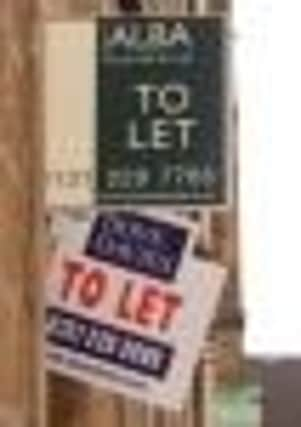David Alexander: Signs point to key changes in rental property market


Yet this is a sentiment at odds with three reports published which recently indicate that the level of home ownership in Britain has actually peaked and that, whatever their aspirations, there are substantial numbers of the population who will have no option but to look to renting for the rest of their lives.
One of the reports showed that only 66 per cent of homes were owned by those who lived in them, down from a peak of 71 per cent nine years ago. These figures were released by the Department of Communities and Local Government (for England and Wales), and given Scotland’s history of rented housing tenure, the proportion of owner-occupiers north of the Border is likely to be lower still.
Advertisement
Hide AdAdvertisement
Hide AdAnother report, by the Resolution Foundation, claimed that the 5.8 million households earning the average wage of £22,000 a year would take 22 years to raise a deposit on a first-time buyer property priced at £124,500, based on saving £1000 a year. This is a particular problem for younger people in Edinburgh, where price levels are higher than the national average and so are the down payments.
The third report, by financial information firm Moneyfacts, intimated that the average fee for arranging a mortgage had increased from £889 to £1498 in just 12 months.
In the days before lenders tore up the rule book, mortgage applicants were required to pass strict criteria relating to annual salary and were quizzed on future earnings prospects, spending habits on non-essentials and even their intentions about starting a family. Then, as the concept of mutuality dissipated, lenders began offering mortgages at unsustainable LTV (loan to value ratios); in some cases as much as 125 per cent of a property’s value.
Now it’s back to sackcloth and ashes – and with a vengeance. The result is that no matter how safe their job or how good their career prospects, the majority of young people aspiring to home ownership are unlikely to be granted a mortgage without the ability to put down a substantial deposit of around 20 per cent.
I am wary of optimists who claim that a “correction” (cue euphemism for a decrease) in prices will eventually kick-start the market back to life. Even should the price of the aforementioned starter home fall from £124,500 to, say, £118,500, a deposit of 20 per cent means the buyer would still need to produce more than £23,000 up front.
In the circumstances it seems appropriate to compare this scenario with the costs of securing a home on the rental market, where increasingly tenants are being offered the option of leases that go on for years rather than for just six months which until recently was the norm. For a two-bedroom flat in a popular area of Edinburgh such as Bruntsfield or Stockbridge, these charges will be the first month’s rent in advance (typically £800 or slightly more) and a returnable deposit equivalent to a month’s rent – total £1600. The landlord will be responsible for maintaining the property and when the lease expires the occupants will be in a position to walk away.
Given the huge chasm between the set-up costs of buying and renting, the latter will increasingly be looked upon by younger members of the population as the only practical option – not just for the short term but perhaps into middle age and even for the rest of their natural lives. One highly significant symptom of this trend is the return of unfurnished lettings – which was the way earlier generations lived. By enabling tenants (some of whom are former owner-occupiers) to put their mark on a property and make it a “home”, these are proving particularly popular.
For many, home ownership is also driven by a desire to realise a capital asset which can act as a safety net in retirement or passed on to children. This is why, until recently, most folks have taken a view that over, say, a 25-year period it is daft to rent rather than buy. However, given the huge difference in the set-up costs of the two forms of tenure – and zero or low house price inflation – it could reasonably be claimed that, for some people at least, it is now daft to buy rather than rent.
Advertisement
Hide AdAdvertisement
Hide AdI am prepared to accept that the majority of our population will continue to prefer home-ownership over renting, but it is a hard fact of life that aspiration and attainment are not always mutually inclusive. The result is that more of Edinburgh’s up and coming citizens will rent their homes, albeit they will be answerable to a private or corporate landlord rather than the “corporation” as in their parents’ and grandparents’ day. It is no longer a question of if but when – and how society deals with it.
• David Alexander is proprietor of DJ Alexander, which manages around 4000 properties in Edinburgh